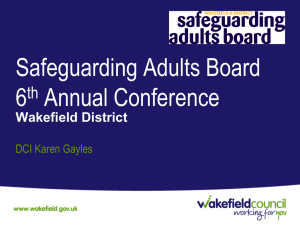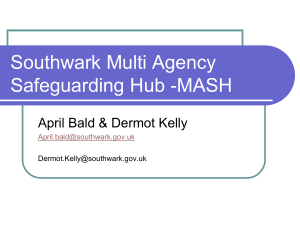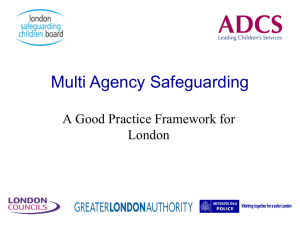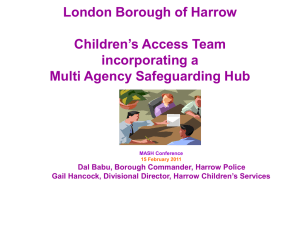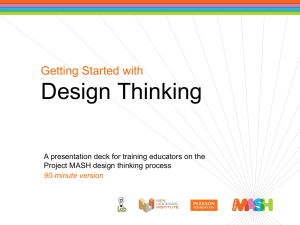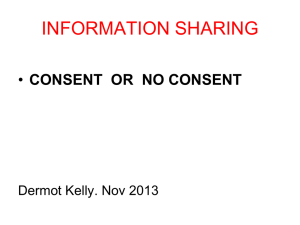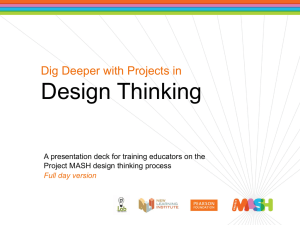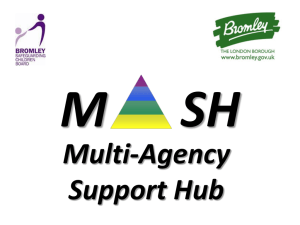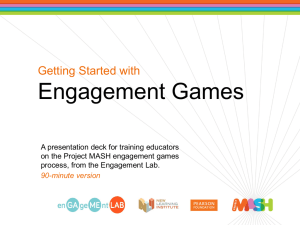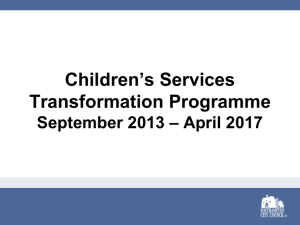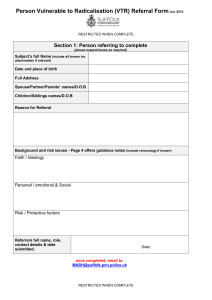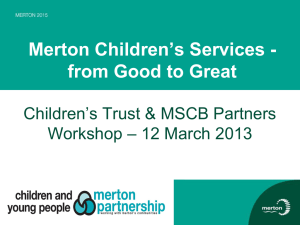LB Haringey - Multi-agency working from MAT to MASH
advertisement
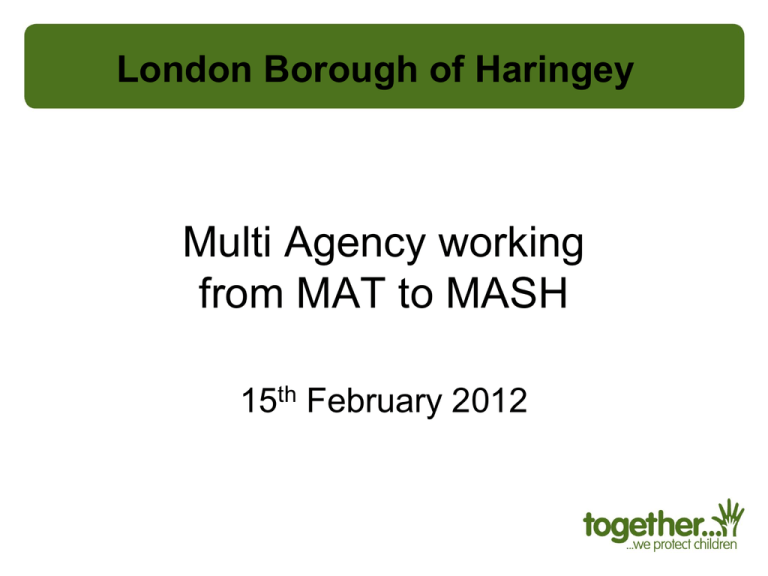
London Borough of Haringey Multi Agency working from MAT to MASH 15th February 2012 Topics to be covered • The Coming of First Response Multi Agency Team (FRMAT) • Development of MASH • Benefits of multi-agency working • What next? The coming of First Response Multi Agency Team (FRMAT) • 2008 • ‘Social care, health and police authorities do not communicate and collaborate routinely and consistently to ensure effective assessment, planning and review of cases of vulnerable children and young people.’ (Ofsted/HMIC/Healthcare Commission, Joint Area Review November 2008) • 2011 • ‘The co-location of staff from the police public protection department, health and education welfare within the First Response Team has resulted in more effective use of intelligence and better coordination of adult risk management processes to ensure that children and young people are properly protected.’ (Ofsted, Unannounced inspection of contact, referral and assessment October 2011 ) The coming of FRMAT: from strategic to operational • Gaining partnership buy in and ownership from the strategic top down to front line staff • Initial multi agency trial in February 2009 for limited period • Social work screening team developed in March 2009 • Finding suitable accommodation • Agreeing thresholds across the partnership • Bringing different staff cultures, beliefs and working practices together Health input to FR MAT • Increased joint working between health and social work. • The health visitors are now attached to the 4 duty teams resulting in more joint visits and greater SW awareness of health needs. • All under 4’s are screened to ensure that they have a GP/ HV. Health Input continued • Contact between GPs and SW enhanced • Greater understanding of need for sharing of relevant information • Identification of mental health service users enabling specialist assessment of impact of mental illness or substance misuse • Greater contribution to CP conference process Impact on performance - Health OUTCOME HEALTH INVOLVEMENT DEC 2011 IN 0-4 Specialist HV 421 169 72 Decisions at screening /IA with specialist Health Visitor Involvement Ensuring health needs are assessed and met NFA's referred to Health Visiting More accurate assessment of need and risk 421 21 NFA's moving between thresholds as a result of Health Information Identify opportunities/strategies for early intervention 21 2 contacts that identify children not known to universal Health Services Contact requiring health assessment are achieved 169 11 joint home assessments undertaken by health & social care Health present at all relevant strategy meetings Number identified with no GP specific health need identified requiring prompt action by Health 169 2 Providing timely support to children in need of Primary care 421 7 Providing timely support to priority children 421 17 MASH development – Project Board and project management arrangements Board Membership Haringey Council: • Deputy Director Children and Families (Chair), Assistant Director Safeguarding, Head of Service First Response, Head of Service Safeguarding Adults & DoLs, YOS Manager, Head of Housing Support & Options, Application Solutions Manager (IT), Project Manager Health partnership: • Designated Nurse Child Protection (NHS North Central London), Named Nurse Child Protection (Whittington Health), Clinical Lead Nurse, Safeguarding Adults and Children Service Manager (BEH Mental Health Trust) Metropolitan Police Service: • Detective Inspector MASH and INTEL Projects MPS, A/Chief Inspector Partnerships, Inspector Haringey Community Liaison & Mental Health, Detective Chief Inspector, Detective Inspector SCD5 Haringey Child Abuse Investigation Team, Superintendent SCD5 London Probation Trust: • ACO Haringey and Partnerships MASH development - Operational Key discussion areas: • Who would sit inside and outside of the MASH • How MASH would differ from FRMAT • Funding and resourcing MASH • Staff engagement MASH development – Governance • Defining and agreeing information sharing and governance arrangements • How information could be securely stored on Framework-i (Council’s Children’s Services database) • Meeting MET security and access requirements Who is in MASH – Core? co-located daily: • First Response Screening Team (Haringey Council) • Public Protection Desk (MET Police) • Specialist Health Visitors • YOS Police (MET Police) - new • Community Safety Unit (MET Police) • Health Administrator (Whittington Health, Barnet Enfield & Haringey Mental Health Trust and NHS North Central London) - new • Child Abuse Investigation Team referral desk (SCD5 Police) - new Who is in MASH – Satellite? co-located at least one day per week: • Adult Safeguarding Team (Haringey Council) - new • Adult Mental Health (Barnet Enfield & Haringey Mental Health Trust) • Probation (London Probation Trust) – new • Access to databases:YOIS – new school admissions, housing (OMHS) What are the benefits of co-location? • Greater information gathered from across the partnership at the referral stage which leads to better informed decision making on whether an initial assessment or early help is required • Urgent referrals that come to the notice of the Public Protection Desk are passed in a timely manner to the duty team, thus enabling a quicker response • Co-location enables improved understanding of partner disciplines which leads to stronger and more efficient collaborative working More benefits • Enables the partnership to review thresholds and practice regularly • Leads to greater analysis of the types of cases being referred to the partnership, resulting in targeted commissioned work i.e. focus on Roma community and domestic violence • Enabling partnership challenge more readily • MASH meets Munro best practice Changing outcomes • The percentage of re-referrals within 12 months of the previous referral has reduced • Contacts into the service have reduced: • The percentage of referral progressing to assessment has increased. • The number of initial assessments has increased with the number of s47 investigation reducing. What impact will MASH have on commissioning? • Ability to re-think our early help offer • Potential to pool MASH resources in the future – local/regional/national • Increased knowledge enables targeting of resources in a more strategic and systemic way e.g. emerging communities What is the future? • Expand MASH to include safeguarding adults • Set up partnership data monitoring and value for money mechanisms • Measure how MASH has improved safeguarding of vulnerable families • Improved identification of those who could be diverted at a lower level • Reduction in number of families in need of highest threshold support (long term)
